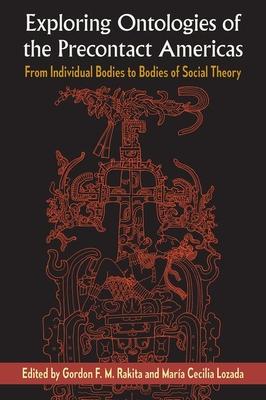
Book
Exploring Ontologies of the Precontact Americas: From Individual Bodies to Bodies of Social Theory
(Write a Review)
Hardcover
$105.56
perspectives in the interpretation of bioarchaeological research This
volume demonstrates how researchers in bioarchaeology and mortuary archaeology can
work to better understand concepts of life and death in past societies of the
Indigenous Americas. Through case studies that apply the "ontological turn" to
human funerary and skeletal remains, contributors set aside Western views of
reality, nature, and personhood to explore how people of various cultures understood
existence and the human body. Contributors
examine mortuary records from Inuit groups in Labrador and Greenland, Hopewell
culture in the Lower Illinois River Valley, and Weeden Island and Puebloan traditions
in the United States Southeast and Southwest. They look at the Paquim community
in Mexico, iconography of the Maya civilization, the demographics of Inka populations,
and an ancient village on the Amazon River in Brazil. With attention to the
viewpoints of these cultures, these essays deconstruct the boundaries between
human remains and other interred artifacts, the living and the dead, and other
binaries rooted deeply in Western science. Exploring
Ontologies of the Precontact Americas reminds readers that their own
ontological perspectives affect how they interpret the past. By considering
diverse, non-Western worldviews and engaging with novel social theories of the
body, this volume inspires new understandings of precontact societies.
Contributors: Gordon F. M. Rakita Pamela Geller
Jason L. King Sarah Jackson Jane Buikstra Robert Pickering Peter
Whitridge John Krigbaum Neill J. Wallis Adrianne Offenbecker
Avelino Gambim Jnior Bethany L. Turner Mari Kleist Mara Cecilia
Lozada Debra L. Martin Kyle Waller James L. Fitzsimmons J.
Christina Freiberger
perspectives in the interpretation of bioarchaeological research This
volume demonstrates how researchers in bioarchaeology and mortuary archaeology can
work to better understand concepts of life and death in past societies of the
Indigenous Americas. Through case studies that apply the "ontological turn" to
human funerary and skeletal remains, contributors set aside Western views of
reality, nature, and personhood to explore how people of various cultures understood
existence and the human body. Contributors
examine mortuary records from Inuit groups in Labrador and Greenland, Hopewell
culture in the Lower Illinois River Valley, and Weeden Island and Puebloan traditions
in the United States Southeast and Southwest. They look at the Paquim community
in Mexico, iconography of the Maya civilization, the demographics of Inka populations,
and an ancient village on the Amazon River in Brazil. With attention to the
viewpoints of these cultures, these essays deconstruct the boundaries between
human remains and other interred artifacts, the living and the dead, and other
binaries rooted deeply in Western science. Exploring
Ontologies of the Precontact Americas reminds readers that their own
ontological perspectives affect how they interpret the past. By considering
diverse, non-Western worldviews and engaging with novel social theories of the
body, this volume inspires new understandings of precontact societies.
Contributors: Gordon F. M. Rakita Pamela Geller
Jason L. King Sarah Jackson Jane Buikstra Robert Pickering Peter
Whitridge John Krigbaum Neill J. Wallis Adrianne Offenbecker
Avelino Gambim Jnior Bethany L. Turner Mari Kleist Mara Cecilia
Lozada Debra L. Martin Kyle Waller James L. Fitzsimmons J.
Christina Freiberger
Hardcover
$105.56